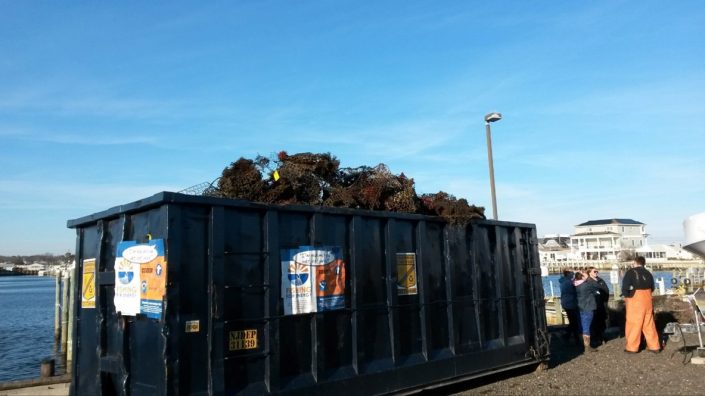CWF Supports Efforts to Remove Marine Debris from Barnegat Bay
by Meaghan Lyon, Wildlife Biologist

CWF and Fishing for Energy are excited to announce the addition of a new port in Waretown, New Jersey, where a bin will be placed to collect marine debris removed from Barnegat Bay. Lost, abandoned, and discarded fishing gear threatens important marine wildlife in this USEPA Estuary of National Significance. Barnegat Bay contributes over $4 billion each year to the regional economy, and is home to 560,000 people, and over 1 million people during summer.
Fishing for Energy is an innovative public-private partnership that provides commercial fishermen with a cost-free solution to dispose of derelict fishing gear or gear that is lost, abandoned or discarded. Fishing for Energy is a nationwide partnership between the National Fish and Wildlife Foundation (NFWF), the National Oceanic and Atmospheric Administration Marine Debris Program (NOAA MDP); Covanta, a world-leading sustainable waste and energy solutions company; and Schnitzer Steel Industries, one of the largest metal recycling companies in the United States.
The partnership offers conveniently located collection bins to dispose of old fishing gear, making it easy for fishing communities to deal with the issue of derelict gear. As a result, the partnership reduces the amount of gear that ends up in U.S. coastal waters. The partnership also recycles gear made of metal and in some cases can even processes the remaining gear and debris to generate renewable energy at Covanta’s Energy-from-Waste facilities.
The bin is expected to collect several tons of derelict crab pots over the course of 2 years. Derelict crab pots continue to kill marine crabs, turtles, and fish as long as they are “lost” and therefore unchecked. In New Jersey, local fishermen estimate that 10% are lost annually. Northern diamondback terrapins, Blue crab, American eel, Flounder, Black sea bass, Atlantic croaker, White perch, Catfish, Spot, Tautog, Oyster toadfish, Whelks, Blackfish, Red-bearded sponge, and many others are impacted by these ghost crab pots.
The disposal bin will be placed and ready for collection at the end of winter 2022. Over the next few years, CWF aims to increase involvement in marine debris removal efforts to help provide clean and safe habitats for local wildlife. Stay tuned for project updates and volunteer events upcoming in 2022.
For more information on the partnership visit:
www.nfwf.org/fishingforenergy or check out CWF’s project page on ghost crab pot removal.
Discover more from Conserve Wildlife Foundation of NJ
Subscribe to get the latest posts sent to your email.